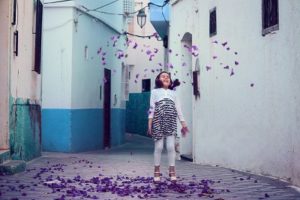“Then King David was told, ‘The Lord has blessed Obed-edom’s household and everything he has because of the Ark of God.’ So David went there and brought the Ark of God from the house of Obed-edom to the City of David with a great celebration. After the men who were carrying the Ark of the Lord had gone six steps, David sacrificed a bull and a fattened calf. And David danced before the Lord with all his might, wearing a priestly garment. So David and all the people of Israel brought up the Ark of the Lord with shouts of joy and the blowing of rams’ horns.” 2 Samuel 6:12-15, NLT.

Sometimes when we think of God, we think only of reverence, justice, and even seriousness. And God is all those things, but God is also the true source of joy. He loves when his children come to him in praise and thanksgiving. In fact, celebrations were built into the law that God gave to the people of Israel.
Read this article from the NLT Study Bible describing David’s celebration in 2 Samuel 6 when the Ark of the Covenant was returned to Jerusalem.
It took two attempts for David to bring the Ark of the Covenant to Jerusalem (6:1-11, 12-23). In the second attempt, there was a notable change in David’s mode of celebrating. Three Hebrew terms for “danced/dancing” are found in the account of the second procession of the ark (see also 1 Chr 15:25-29): karar (6:14, 16), pazaz (NLT, “leaping,” 6:16), and raqad (1 Chr 15:29, “skipping about”). All three words refer to vigorous physical expression beyond the meaning of the Hebrew term for “celebrate” (6:5). Thus, in the first procession, David celebrated; in the second procession he engaged in exultant dancing and extravagant merrymaking with intensified musical expression through the addition of shouting and trumpets.

Musical instruments played a significant role in Temple worship. In 1 Chr 25, David assigned various groups to the ministry of music. Many Psalms refer to playing musical instruments in praise and worship of God (see Ps 33:2-3; 57:8; 81:2; 92:1-3; 98:4-6). In Ps 149 and 150, dance and music are combined as a praise offering. Similarly, music and dancing were heard in the father’s house in the parable of the lost son (Luke 15:25), as the son’s return was truly a joyful occasion.
All these instances demonstrate that God welcomes exuberant expressions of joy and delight from those who worship and praise him (Isa 30:29; Jer 30:19; 31:13; Zeph 3:17; Eph 5:19; Col 3:16).
Take a Look Inside the NLT Study Bible:


